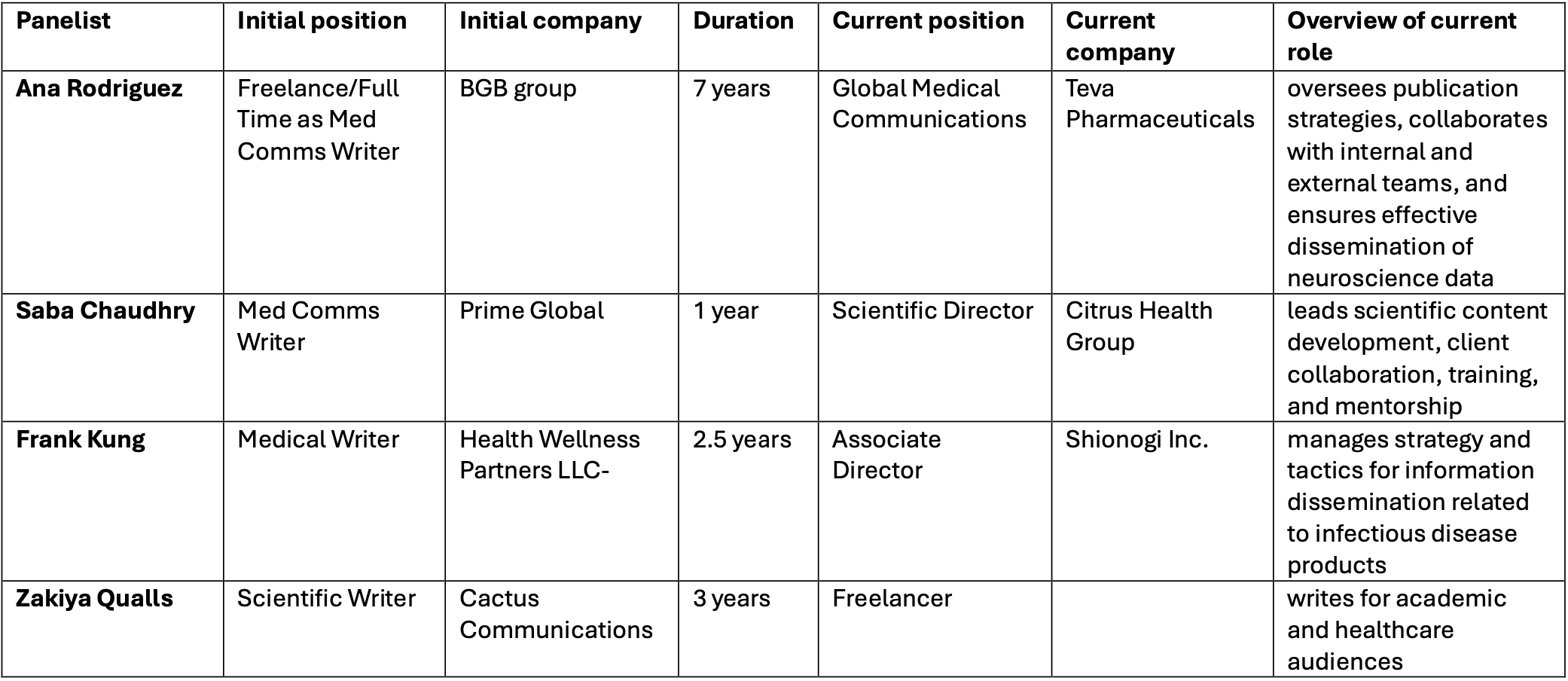By Naureen Hameed
The COVID-19 pandemic reshaped numerous industries, accelerating the shift toward remote and hybrid work models. Medical Communication (Med Comms) is one of many jobs that has become more accessible, and therefore, more popular with an increase in remote and hybrid work. Med Comms is a form of scientific communications directed towards healthcare professionals, patients, the public, and other stakeholders. The primary skills required for Med Comms is the ability to write clearly, accurately, and efficiently and good communication within a team to be able to give and receive constructive criticism. Fortunately, these skills are often obtained during your PhD.
If science communication and remote work are of interest to you, then a position in Med Comms may be worth exploring further. Luckily, our Rutgers iJOBS program recently hosted a career panel featuring Med Comms professionals who shared their career trajectories, daily responsibilities, and tips for breaking into the field. This article highlights the skills required for a position in Med Comms along with the day-to-day responsibilities, potential career trajectories, and general advice from four panelists.
How It Started
Two of the panelists, Ana Rodriguez and Zakiya Qualls, entered Med Comms immediately after completing their PhDs. As graduate students at Rutgers University, they learned about Med Comms in a similar iJOBS Med Comms career panel event and decided it fit the life they envisioned for themselves after completing their PhDs. Zakiya attributes her involvement in the iJOBS blog and at the National Institute of Health (NIH) to her success during the hiring process at BGB group, a major independent healthcare advertising company based in New York City. Other panelists transitioned into Med Comms later in their careers, like Frank Kung and Saba Chaudhry who discovered their passion for writing after advanced academic roles. Saba utilized the wide network of colleagues she gained when she was a senior scientist at the NIH as well as some pharmaceutical companies to transition into Med Comm.
How Its Going
All the panelists started as medical writers focusing on content creation as their first positions in Med Comms. Often, this involved creating content including manuscript reviews, abstracts, posters, and slide decks, for academic audiences along with healthcare professionals, regulatory bodies, and pharmaceutical companies. Many of the panelists were grateful for this experience at the beginning of their career because it exposed them to a diverse audience and taught them how to tailor their writing style for each audience. Over time, each panelist advanced to a more managerial position. Ana and Frank are currently involved in client-facing roles at pharma companies while Saba and Zakiya still make content for medical writing agencies.
As the panelists discussed their experiences in Med Comms, it was clear that their transitions from one position to the next were very natural. The panelists had some proclivity toward a certain aspect in their initial role, established a network based on that talent or interest, and found ways to use their network and skills to progress into the next position. For example, Frank became a strong leader and communicator as the president of postdoctoral association at Rutgers and found himself applying these skills when he moved to more senior roles, including his current role as an Associate Director for Shionogi Inc. This job requires Frank to coordinate with global teams to ensure all communication aligns with the company’s scientific strategy. The following table provides an overview of the different panelist’s trajectory in Med Comms:

The Good, The Bad and the… Advice
As Dr. Qualls put it best, Med Comms had everything that she and likely many graduate students wanted, a high-income potential, flexible work hours, and the capacity to mold the position to best suit her interests and lifestyle. For Dr. Qualls, her Med Comms positions provided a stable workflow while still being able to homeschool her children. The main challenge for most incoming Med Comms hires is the initial content creation role. Unless you love to write, the volume and versatility of writing styles required for this job may be daunting. The panelists suggest the following to anyone interested in entering the Med Comms world:
- Build a portfolio that showcases strong writing skills, with text that focuses on conveying complex scientific information clearly, accurately, and efficiently. You must have thick skin to survive in this area, as you may not write as well as you think! To hone these skills during graduate school, join writing groups or blogging initiatives where you can meet peers who are ready to provide constructive criticism (you should’ve seen the first draft of this article before my editor got her hands on it!)
- Get your foot in the door. Get involved in entry roles at Med Comms agencies to learn agency-level writing, such as manuscript development and publication planning. Then, pursue roles with increased responsibility, such as content strategy, client management, or team leadership.
- Networking, networking, and networking! Leverage networking opportunities and connect with Med Comms professionals. This is one of the best ways to get your foot in the door and advance your career.
Med Comms is a versatile field with positions available to individuals at various stages of their careers and from different industries, including academia. The key to success within Med Comms depends on your writing skills, networking, and ability to leverage your skill sets. However, perhaps the most important takeaway is that this field needs more qualified scientists to mitigate the spread of scientific misinformation. The COVID-19 pandemic brought with it a beneficial change to many work environments, but it also created its own pandemic of scientific misinformation. The future of scientific communications is in our hands, so having well-trained trained scientists leading the space of science communication will serve as a formidable tool to combat this pandemic.
This article was edited by Senior Editor Antonia Kaz.